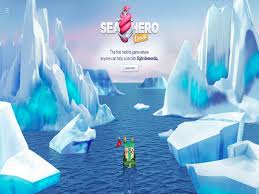Aging | Global Aging | Innovation | May 23, 2016
How You Can Fight Dementia with Your Thumbs
BY GlobalAgeing
by Geralyn Magan
A new mobile video game called Sea Hero Quest guides players through a maze of arctic rivers, golden shores, and mystic marshes. Along the way, gamers chase magical creatures and collect starfish that they can trade in for equipment improvements.
As cool as all this sounds, Sea Hero Quest isn’t all fun and games.
Instead, researchers call the game “a massive online citizen science experiment” that will help them fight dementia.
That’s why they’re inviting gamers from around the world to download the free game on iOS and Android devices and start playing.
While gamers enjoy their mythical journeys, scientists will be keeping close tabs on the routes they take during the game. Using that data, they’ll create global “heat maps” that track how players navigate the 3D levels in the game. That information will help researchers create a baseline for how “normal” players navigate 3D environments, reports MobiHealthNews.
What’s all this got to do with dementia? Researchers say that the ability to navigate 3D environments is often one of the first skills lost as people develop the condition.
Creating a Diagnostic Test and a Global Movement
The Sea Hero Quest game was developed by Alzheimer’s Research UK, University College London (UCL), the University of East Anglia, and Glitchers, a game developer. Communications giant Deutsche Telekom is supporting the project.
The scientists have a lofty end-game in mind. They’d like to use the data they collect to develop new diagnostic tests that can detect when somebody’s spatial navigation skills are failing.
In the process, they hope to create a global movement to fight dementia.
“We knew that there must be a way of empowering everyone to share their time to help to move us one step closer to a breakthrough in the field of dementia,” said Hans-Christian Schwingen, Deutsche Telekom’s chief brand officer in a statement. “At the same time, we realized that if we wanted to achieve real scale and truly make a difference, we needed to make it fun for everyone involved. We needed to create something that would get people gaming for good.”
Fast Data
Sea Hero Quest offers researchers an added bonus: speed. Researchers can collect useful data from the game about 150 times faster than in lab-based experiments.
“In my research team, I could only test about 200 people a year, and that’s working hard,” Dr Hugo Spiers, a researcher at UCL, told the BBC. “But last night I tested 200 people in one minute with this game.”
Two minutes of gameplay represent 5 hours of conventional research, says Deutsche Telekom. If 100,000 people play the game for those 2 minutes, researchers can generate the equivalent of more than 50 years of lab-based research.
“Until now, these kind of investigations took years to coordinate and at best gave us a snapshot of how a very small sample of volunteers behaved,” says Alzheimer’s Research UK Chief Executive Hilary Evans. “Providing the research community with access to an open source data set of this nature, at this scale, in such a short period of time, is exactly the kind of innovation required to unlock the next breakthrough in dementia research.”

Recently Added
Translate »




